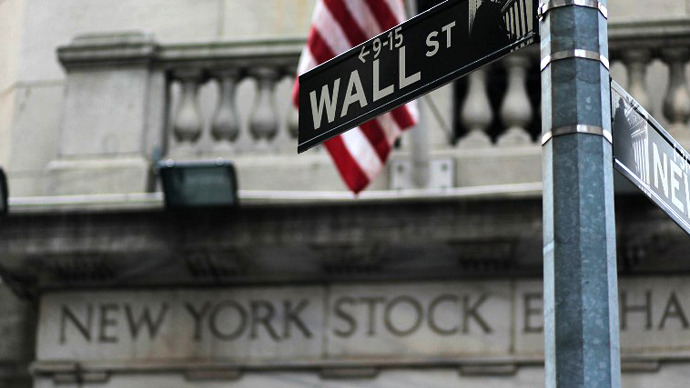~ how long r we gonna allow this ~

Bank lobbyists have a direct influence on financial
legislation drafted in Congress, and are in some cases even writing the
measures themselves. Citigroup this month drafted a regulation bill that
has already passed through a House committee.
To soften financial regulations, bank lobbyists frequently ‘assist’ lawmakers in writing draft legislation that serves to benefit them at the expense of American taxpayers, according to a New York Times investigation.
Lobbyists working for Citigroup Inc., a multinational financial services corporation, wrote 80 percent of a regulation bill that was approved by the House Financial Services Committee this month. Citigroup wrote 70 lines of 85-line bill, which exempts “broad swathes of trades” from new regulation, the Times reported based on e-mails it obtained.
Two paragraphs of the bill were copied “nearly word for word” from what Citigroup drafted. The only difference between the versions were two words, which lawmakers changed to make plural.
The Dodd-Frank Wall Street Reform and Consumer Protection Act, which was signed into law in 2010, inflicted heavy financial regulatory reform following the most recent recession. The bill was pushed into law by Democrats, but now, both Democrats in the House and Senate are siding with bank lobbyists to roll back parts of the regulation overhaul.
The bill drafted primarily by Citigroup this month was starkly opposed by the Treasury Department, but easily made it through the House Financial Services Committee, the Times reports. MapLight, a nonprofit group that analyzes campaign finance records, found that lawmakers who supported Wall Street’s legislation received twice as much in contributions from financial institutions than those who opposed such measures, which appears to indicate that lawmakers’ support can be bought.
This month, Wall Street groups also held fundraising dinners for lawmakers who co-sponsored the bills they backed and in some cases co-wrote. As a reward for siding with bank lobbyists, these lawmakers were granted a dinner in which attendees paid up to $2,500 for a plate.
When questioned by the Times, bank industry officials said that helping draft legislation was a common practice on Capitol Hill, but argued that they do not undermine Dodd-Frank.
“We will provide input if we see a bill and it is something we have interest in,” said Kenneth E. Bentsen Jr., a Wall Street lobbyist. Bentsen is a former lawmaker himself, and many financial institutions’ lobbyists have worked as Capitol Hill aides and staffers before taking on their current roles.
Jeff Connaughton, a former lobbyist and former congressional staffer, said that Wall Street has so much influence on the Hill that it “skews the thinking of Congress.”
“It’s appalling, it’s disgusting, it’s wasteful and it opens the possibility of conflicts of interest and corruption,” Rep. Jim Himes, a top recipient of Wall Street donations and a former banker at Goldman Sachs, told the Times, admitting his own faults. “It’s unfortunately the world we live in.”
Wall Street is writing its own regulation bill
Published time: May 24, 2013 19:21
Edited time: May 25, 2013 14:02
Edited time: May 25, 2013 14:02

AFP Photo / Getty Images / Chris Hondros
To soften financial regulations, bank lobbyists frequently ‘assist’ lawmakers in writing draft legislation that serves to benefit them at the expense of American taxpayers, according to a New York Times investigation.
Lobbyists working for Citigroup Inc., a multinational financial services corporation, wrote 80 percent of a regulation bill that was approved by the House Financial Services Committee this month. Citigroup wrote 70 lines of 85-line bill, which exempts “broad swathes of trades” from new regulation, the Times reported based on e-mails it obtained.
Two paragraphs of the bill were copied “nearly word for word” from what Citigroup drafted. The only difference between the versions were two words, which lawmakers changed to make plural.
The Dodd-Frank Wall Street Reform and Consumer Protection Act, which was signed into law in 2010, inflicted heavy financial regulatory reform following the most recent recession. The bill was pushed into law by Democrats, but now, both Democrats in the House and Senate are siding with bank lobbyists to roll back parts of the regulation overhaul.
The bill drafted primarily by Citigroup this month was starkly opposed by the Treasury Department, but easily made it through the House Financial Services Committee, the Times reports. MapLight, a nonprofit group that analyzes campaign finance records, found that lawmakers who supported Wall Street’s legislation received twice as much in contributions from financial institutions than those who opposed such measures, which appears to indicate that lawmakers’ support can be bought.
This month, Wall Street groups also held fundraising dinners for lawmakers who co-sponsored the bills they backed and in some cases co-wrote. As a reward for siding with bank lobbyists, these lawmakers were granted a dinner in which attendees paid up to $2,500 for a plate.
When questioned by the Times, bank industry officials said that helping draft legislation was a common practice on Capitol Hill, but argued that they do not undermine Dodd-Frank.
“We will provide input if we see a bill and it is something we have interest in,” said Kenneth E. Bentsen Jr., a Wall Street lobbyist. Bentsen is a former lawmaker himself, and many financial institutions’ lobbyists have worked as Capitol Hill aides and staffers before taking on their current roles.
Jeff Connaughton, a former lobbyist and former congressional staffer, said that Wall Street has so much influence on the Hill that it “skews the thinking of Congress.”
“It’s appalling, it’s disgusting, it’s wasteful and it opens the possibility of conflicts of interest and corruption,” Rep. Jim Himes, a top recipient of Wall Street donations and a former banker at Goldman Sachs, told the Times, admitting his own faults. “It’s unfortunately the world we live in.”
No comments:
Post a Comment